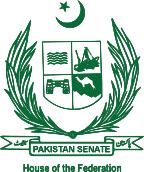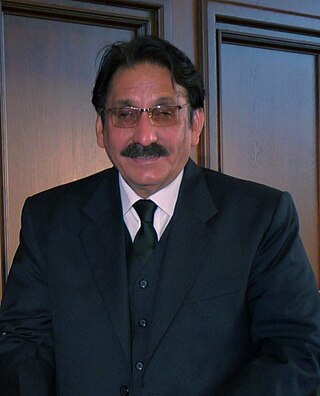Related Research Articles

The president of Pakistan is the head of state of the Islamic Republic of Pakistan. The president is the nominal head of the executive and the supreme commander of the Pakistan Armed Forces. The presidency is a ceremonial position in Pakistan. The president is bound to act on advice of the prime minister and cabinet. Asif Ali Zardari is the current president since 10 March 2024.

The prime minister of Pakistan is the head of government of the Islamic Republic of Pakistan. Executive authority is vested in the prime minister and his chosen cabinet, despite the president of Pakistan serving as the nominal head of executive. The prime minister is often the leader of the party or the coalition with a majority in the lower house of the Parliament of Pakistan, the National Assembly where he serves as Leader of the House. Prime minister holds office by virtue of their ability to command the confidence of the National Assembly. The prime minister is designated as the "chief executive of the Islamic Republic".

The Senate of Pakistan, constitutionally the House of the Federation, is the upper house of the bicameral Parliament of Pakistan. As of 2023, It has a maximum membership of 96, of which 92 are elected by the provincial legislatures using single transferable vote; four represent the federal capital. Members sit for terms lasting six years, with half of the house up for election every three years. Unlike the National Assembly, the Senate is a continuing chamber and hence not subject to dissolution.

The National Assembly of Pakistan is the lower house of the bicameral Parliament of Pakistan, with the upper house being the Senate. As of 2023, the National Assembly has a maximum membership of 336, of which 266 are directly elected by an adult universal suffrage and a first-past-the-post system to represent their respective constituencies, while 60 are elected on reserved seats for women and religious minorities from all over the country. Members hold their seats for five years or until the house is dissolved by the President on the advice of the Prime Minister. The house convenes at the Parliament House, Red Zone, Islamabad.

The Parliament of Pakistan is the supreme legislative body of the Islamic Republic of Pakistan. It is a bicameral federal legislature, composed of the President of Pakistan and two houses: the Senate and the National Assembly. The president, as head of the legislature, has the power to summon or prorogue either house of the Parliament. The president can dissolve the National Assembly, only on the Prime Minister's advice.

Since its establishment in 1947, Pakistan has had a non-symmetric federal government and is a federal parliamentary democratic republic. At the national level, the people of Pakistan elect a bicameral legislature, the Parliament of Pakistan. The parliament consists of a lower house called the National Assembly, which is elected directly via first-past-the-post voting, and an upper house called the Senate, whose members are chosen by elected provincial legislators. The head of government, the Prime Minister, is elected by the majority members of the National Assembly and the head of state, the President, is elected by the Electoral College, which consists of both houses of Parliament together with the four provincial assemblies. In addition to the national parliament and the provincial assemblies, Pakistan also has more than five thousand elected local governments.

The Commission on Elections, abbreviated as COMELEC, is one of the three constitutional commissions of the Philippines. Its principal role is to enforce all laws and regulations relative to the conduct of elections in the Philippines.

Iftikhar Muhammad Chaudhry is a Pakistani jurist who served as the 20th Chief Justice of Pakistan over three non-consecutive terms from 29 June 2005 to 11 December 2013.
The Women's Protection Bill which was passed by the National Assembly of Pakistan on 15 November 2006 is an attempt to amend the heavily criticised 1979 Hudood Ordinance laws which govern the punishment for rape and adultery in Pakistan. Critics of the Hudood Ordinance alleged that it made it exceptionally difficult and dangerous to prove an allegation of rape, and thousands of women had been imprisoned as a result of the bill. The bill returned a number of offences from the Zina Ordinance to the Pakistan Penal Code, where they had been before 1979, and created an entirely new set of procedures governing the prosecution of the offences of adultery and fornication. Whipping and amputation were removed as punishments. The law meant women would not be jailed if they were unable to prove rape and their complaints of rape would not be seen as confession of adultery.

The judicial officers of the Republic of Singapore work in the Supreme Court and the State Courts to hear and determine disputes between litigants in civil cases and, in criminal matters, to determine the liability of accused persons and their sentences if they are convicted.

The Election Commission of Pakistan (ECP) is an independent, autonomous, permanent and constitutionally established federal body responsible for organizing and conducting elections to the national parliament, provincial legislatures, local governments, and the office of president of Pakistan, as well as the delimitation of constituencies and preparation of electoral rolls. As per the principles outlined in the Constitution of Pakistan, the Commission makes such arrangements as needed to ensure that the election is conducted honestly, justly, fairly and in accordance with law, and guard against corrupt practices. The Election Commission was formed on 23 March 1956.

The Bangladesh Election Commission, abbreviated and publicly referred to as EC, is an government controlled constitutional body that operates the legal functions of election laws in Bangladesh.

The Chief Election Commissioner is the authority and the appointed chair of the Election Commission of Pakistan— an institution constitutionally empowered to conduct free and fair elections to the national and provincial legislatures.

NA-72 Sialkot-III is a constituency for the National Assembly of Pakistan. It is made up of the Pasrur Tehsil.

The Nineteenth Amendment to the Constitution of Pakistan is a 2011 amendment reforming the judicial appointments procedure as well as expanding the Federally Administered Tribal Areas (FATA).

The Twentieth Amendment Bill to the Constitution of Pakistan was passed by the National Assembly of Pakistan on February 14, 2012. It was then moved to upper house, Senate where it was passed on February 20, 2012 and signed by the President on February 28, 2012.
Zahid Hamid is a Pakistani politician, and lawyer. A member of Pakistan Muslim League (Nawaz), Hamid previously served as the Minister for Law and Justice and Minister of Climate Change in the Third Sharif ministry between 2015 and 2017. He briefly served as the Minister of Law and Justice in June 2013 before being appointed as Minister of Science and Technology from June 2013 to November 2014. He again served as Minister for Law and Justice under Prime Minister Shahid Khaqan Abbasi from August 2017 until he resigned in November 2017.

Syed Mansoor Ali Shah is a Pakistani jurist who is serving as a Judge of the Supreme Court of Pakistan. He formerly served as the 45th Chief Justice of the Lahore High Court.
Sikandar Sultan Raja is a retired Pakistani civil servant who has been the Chief Election Commissioner of Pakistan since January 2020. Raja belongs to the Pakistan Administrative Service and is batchmates with Rizwan Ahmed, Hussain Asghar and Fawad Hasan Fawad.
The Twenty-Sixth Amendment to the Constitution of Pakistan, known officially as the Constitution Act, 2024, is an amendment to the Constitution of Pakistan passed by Parliament in a 'marathon session' between 20–21 October, 2024. Coming into force with Presidential assent the same day. The amendment contains 27 clauses, which effect change in judicial, parliamentary and executive frameworks: modifying aspects of judicial appointments, judicial powers, and adjusting legal procedures. These include the removal of the controversial suo motu prerogative of the Supreme Court, the capping the Chief Justice of Pakistan's (CJP) tenure to three-years, the reconstitution the Judicial Commission of Pakistan (JCP) to sit on judicial appointments, the formation of a separate constitutional bench in the Supreme Court, the limiting of the ability of courts to question the recommendations from Cabinet to the President or Prime Minister, the increasing of Parliamentary oversight, and the establishment of a 12-member Special Committee in Parliament with proportional representation to nominate the CJP from the three most-senior judges in the court.
References
- ↑ "NA unanimously passes 22nd Constitutional Amendment Bill". Radio Pakistan . 19 May 2016. Retrieved 27 June 2017.
- ↑ Anis, Muhammad (20 May 2016). "NA approves the 22nd Amendment Bill". The News International . Retrieved 27 June 2017.
- ↑ Mohal, Shah Nawaz (19 May 2016). "NA amends constitution to empower ECP". Pakistan Today . Retrieved 27 June 2017.
- ↑ Wasim, Amir (3 June 2016). "Senate passes 22nd constitution amendment bill". Dawn . Retrieved 27 June 2017.
- ↑ "President approves 22nd Constitution Amendment". Dawn . 9 June 2016. Retrieved 27 June 2017.
- ↑ "The Gazette of Pakistan" (PDF). Retrieved 27 June 2017.